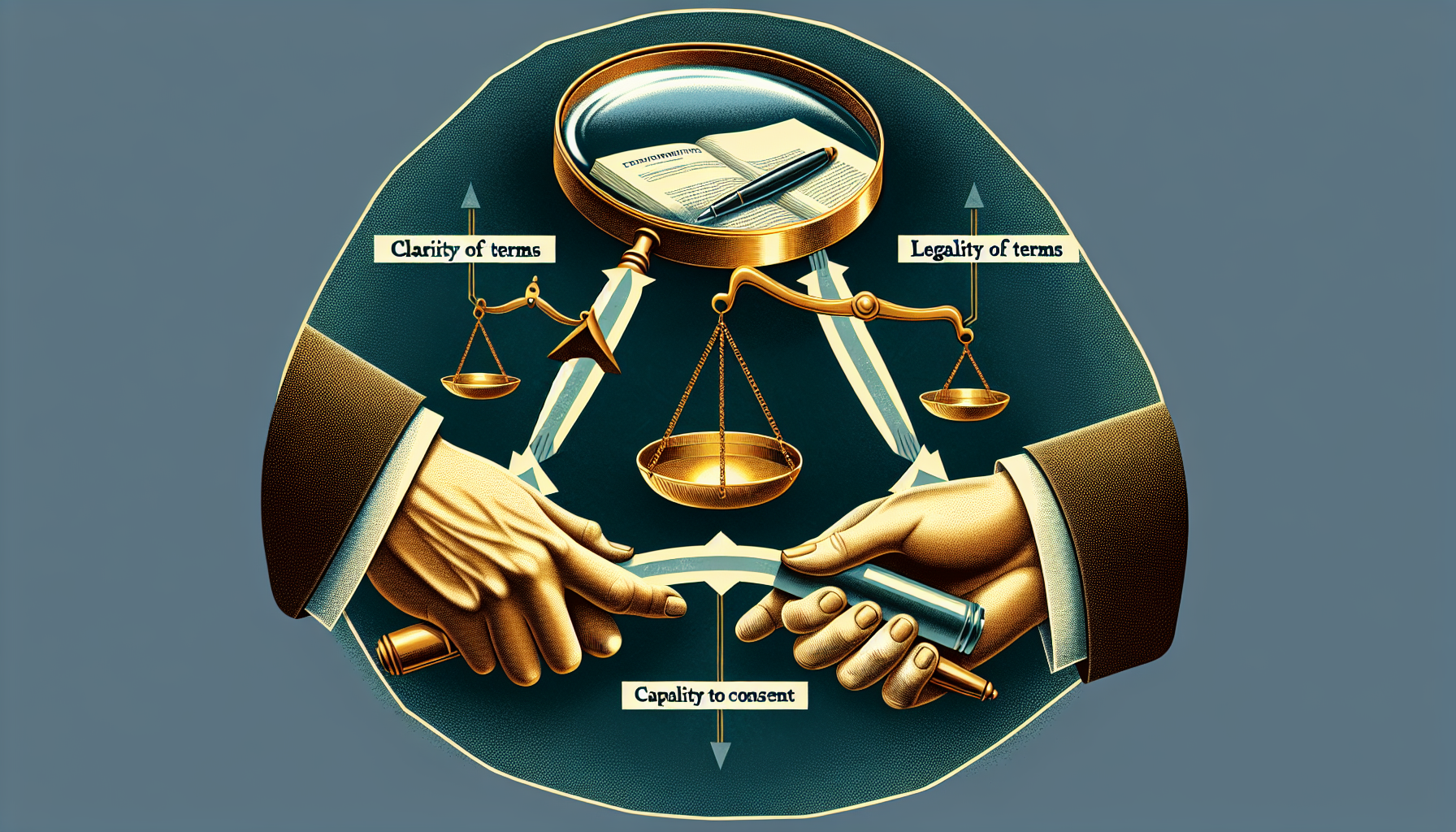Malcolm ZoppiWed May 08 2024
Understanding the Basics: A Comprehensive Contract Law Definition
Contract law is the set of laws that governs the making and enforcement of agreements. A contract law definition encapsulates the procedures, rules, and guidelines that outline what makes an agreement legally binding in a variety of contexts. This article takes you through the pillars of contract law, from contract formation to breach and remedy, […]
Contract law is the set of laws that governs the making and enforcement of agreements. A contract law definition encapsulates the procedures, rules, and guidelines that outline what makes an agreement legally binding in a variety of contexts. This article takes you through the pillars of contract law, from contract formation to breach and remedy, equipping you with the fundamental understanding necessary to approach these legal constructs confidently.
Key Takeaways
Contract law regulates the creation, enforcement, and remedies for breaches of legally enforceable agreements, which require mutual assent, consideration, capacity, legality, and intent.
Oral contracts are legally binding but difficult to prove; hence written contracts are preferred for clarity and ease of enforcement, especially for complex transactions.
Breach of contract, whether material or immaterial, can lead to remedies such as compensatory and consequential damages, specific performance, or restitution to address the harmed party’s losses.
Defining Contract Law

In the realm of contract law, the process by which contracts are established, implemented, and how violations are addressed is governed. When two or more parties decide to undertake or refrain from a specific action thereby establishing legal relations between them, they enter into what’s known as a contract. Such binding agreements define the terms under which these parties interact and can be presented in various forms without necessarily bearing the label “contract.” It’s actually the presence of certain key elements within any agreement that qualifies it as a legally recognized contract.
To deem a contract enforceable by law, it must exhibit several critical components:
Mutual assent evidenced through an offer that is validly extended and accepted.
Sufficient consideration provided by all involved entities.
The capacity of each party to give consent.
The underlying legality governing the contents of said agreement.
A clear intention among those entering into this pact to forge legal bonds with one another.
The existence and execution of such contracts rely upon mutual concurrence—where both (or all) participants concur—to produce arrangements capable not only of enforcement but also subject to rectification should there be breaches therein. Essentially encapsulating what constitutes enforceability in regard to valid contractual exchanges under prevailing laws.
Key Elements of Contract Law
One of the foundational components in contract law is mutual assent, which happens when an offer recognized by law is extended and subsequently accepted. This process can be likened to a choreographed partnership where one party initiates with an offer, while the other acknowledges with acceptance. But it takes more than a simple nod or handshake to confirm this alignment. Explicit acknowledgement such as signing on the dotted line or actions that clearly demonstrate agreement are necessary—neither silence nor lack of response signifies acceptance.
The principle of consideration stands as another crucial aspect within contract law. It involves anything valuable exchanged between those entering into the contractual arrangement—including money, goods, services, or promises for specific action or restraint from action.
In absence of consideration—a token value exchange—the purported contract devolves into merely being seen as a gratuitous promise rather than forming part of any binding pact.
To frame it differently: A legally enforceable contract requires reciprocal benefit among all involved parties, there must be something gained on each side for these agreements to become enforceable under the rule of law.
Common Law vs. Civil Law
In the field of contract law, grasping the difference between common law and civil law frameworks is essential. These systems both strive to achieve equity and justice, but have distinct methodologies for initiating and upholding contracts.
Within civil law jurisdictions prevalent in numerous European countries, there is an established compendium of fundamental principles enshrined within accessible documents. Judges operating under this system proactively ascertain facts and implement the written code. Conversely, judges in common law jurisdictions like those found in the United States or United Kingdom serve primarily as impartial moderators who base their judgments on arguments presented by parties involved. This contrasts with a reliance on judicial precedents that are crucial for maintaining uniformity across legal determinations seen in common-law practices. Meanwhile, commercial dealings within America adhere to a unified set of statutes known as the Uniform Commercial Code.
When considering cross-border disputes involving contract laws from these varied systems, international arbitration emerges often as favored resolution due to its flexibility regarding arbitral regulations selection or choice of jurisdiction influenced by whether participating areas follow either civil or common-law traditions.
Types of Contracts

Every contract, regardless of its complexity, represents a legally binding promise that might be verbalized or put down in writing. These contracts can take the form of either bilateral or unilateral agreements based on how many promises are made and by whom.
In the case of a bilateral contract, there is an exchange of commitments where at least two parties agree to mutual obligations like buying a house in return for payment. Conversely, under a unilateral contract, only one party makes a legally binding pledge which becomes effective when another party completes certain actions.
Oral Contracts
Contracts that are spoken and not written down, known as oral contracts, can still be considered legally binding agreements. The difficulty with these types of contracts lies in their proof and enforcement since they depend on people’s memories without concrete documentation. Oral contract validity may be substantiated through the testimony of witnesses, actions taken by the involved parties or physical evidence such as correspondence via letters or emails and various forms of receipts.
Such challenges make oral contracts better suited for less complex agreements where fewer details are prone to misunderstanding or dispute. For more intricate deals, ambiguity often arises leading to problems when it comes to enforcing the terms. As an example, if you promise a reward for someone who finds your lost pet or supplies information that helps solve a problem—this represents a unilateral oral agreement which becomes enforceable once someone completes the action you have requested.
Written Contracts
Conversely, written contracts offer a definitive record of the agreement and are strongly encouraged for intricate dealings and significant commitments. A tangible document in the form of a written contract provides clarity on terms to all parties involved, thereby aiding enforceability. The advantages of having written agreements include:
Explicit documentation of the understanding between parties
Security against misinterpretations or disputes
Support in upholding contractual obligations
Legal authenticity and binding capacity
In essence, commercial contracts, as well as real estate contracts that are documented in writing, serve as an important instrument for promoting transparency and safeguarding interests within business engagements.
Even though readily available online general form contracts may appear convenient, they might fall short when it comes to addressing particular business requirements adequately, which could result in legal entanglements or confusion. Consequently, customizing contract documentation with professional legal assistance is recommended to cater specifically to one’s unique business needs while minimizing potential future legal challenges.
Enforceability and Validity

In the realm of contract law, discerning the enforceability and legitimacy of contracts is paramount after establishing what constitutes a contract and its various forms. A contract—whether oral or written, unilateral or bilateral—must fulfill specific requirements to be legally binding. These stipulations encompass mutual assent on clear terms of the agreement, the legal capacity of parties to enter into an agreement, and adherence to legal standards within said agreement for it to be enforceable under law.
Capacity to Consent
The concept of the capacity to consent is grounded in a party’s comprehension and ability to meet their obligations under a contract. It’s essential that anyone entering into an agreement has both clarity on what they’re agreeing to and the means with which to uphold their end of the bargain. This becomes particularly significant when considering individuals such as minors or those who are mentally incapacitated, since they may lack full awareness about the significance of their commitments.
For this reason, it’s crucial to verify that each party involved not only grasps all elements entailed within the contract—including duties and prospective repercussions—but also possesses adequate capability for engagement. By doing so, one can ensure these parties are exercising judgment similar to that expected from any reasonable person: making informed decisions voluntarily without being subjected to coercion or manipulation.
Legality and Public Policy
Like a structure founded on unstable terrain is destined to fail, a contract established on illicit undertakings or the violation of societal norms is similarly fated. A contract that obligates any involved party to engage in unlawful conduct or go against public policy will be inherently considered void and without legal effect. Thus, such contracts lack enforceability under law.
Inclusion of even one illegal provision has the potential to invalidate either portions of or an entire agreement. For example, if an arrangement pertains to something outlawed—such as trading marijuana in jurisdictions where its sale contravenes legislation—the resulting contract would be unenforceable. This principle serves as a safeguard ensuring that all contracts promote lawful activities and respect for both community standards and collective well-being.
Clarity and Agreement on Terms
The explicitness of contract terms is essential. It guarantees that the courts can sensibly interpret and examine these terms when settling disputes or evaluating their legal validity. The parties involved must consciously recognize and agree to the actual stipulations outlined in the agreement, securing a common understanding and concurrence on its duties.
The contract should align with legal requirements of the relevant jurisdiction. Its formation should be free from forceful influence, excessive pressure, or any threats against public well-being. In essence, contracting terms should resonate with utmost clarity to circumvent future conflicts while assuring they are legally binding.
Breach of Contract and Remedies

Even when all essential components are present, contracts may yet fail. When one party does not meet their contractual duties, this constitutes a breach of contract. Such breaches can be significant, fundamentally damaging the integrity of the contract, or they can be minor – an immaterial deviation that doesn’t strip the other party of anticipated benefits from the agreement.
Material vs. Immaterial Breaches
A material breach occurs when there’s a significant violation so severe it irreparably damages the essence of the contract, much like a broken mirror that cannot be reassembled. This kind of breach can lead to substantial compensation or provide grounds for terminating the agreement, as it constitutes a profound failure to achieve what was intended at the heart of the contractual agreement.
Conversely, an immaterial breach—often referred to as minor or partial—doesn’t strip away all anticipated benefits from the other party and typically doesn’t justify ending the contract. Such breaches often involve less important terms or technical details. If correction is possible for a material breach, then before any termination takes place, one should give an opportunity to remedy it by offering such chance to the breaching party.
Remedies for Breach
In the event of a contract breach, the party who has not breached (injured party) has access to multiple remedies, which include:
Compensatory damages
Consequential damages
Specific performance
Restitution
The purpose of compensatory damages is to make the injured party whole again by putting them in the situation they would have been in had there been no breach. On top of that, consequential damages cover indirect losses that were foreseeable and occurred as an outcome of the contract violation.
Specific performance may be ordered as a legal remedy compelling the breaching party to fulfill their obligations according to what was initially laid out in their agreement. Alternatively, restitution aims at resetting the injured party’s circumstances to where they stood prior to entering into said contract—effectively undoing any advantages gained through it.
The Role of Contract Attorneys

In the intricate world of contracts, attorneys specializing in contract law are crucial allies. They help both individuals and businesses by interpreting complex legal terms, confirming adherence to regulations, and protecting their clients’ rights and interests. These lawyers are instrumental in creating, scrutinizing, amending agreements as well as helping resolve any disputes that may arise from contracts while guaranteeing regulatory compliance.
Business Formation and Compliance
Securing the services of legal counsel is critical in clarifying the necessary legal stipulations related to contracts, licenses, and other agreements when founding a new enterprise. Attorneys specializing in contracts safeguard companies from potential fines resulting from non-adherence by navigating and applying intricate legal rules.
Businesses gain an advantage over legislative modifications and maintain preemptive adherence through their proficiency in legal matters. Forming an association with a lawyer who focuses on contract law at an early stage helps manage future needs concerning agreements efficiently as the business grows.
Contract Negotiations and Dispute Resolution
Contract lawyers are essential not only in the establishment and adherence to business regulations, but also in managing the intricacies of contract negotiations and resolving disputes. A competent attorney is key for guaranteeing that contracts reflect a clear mutual assent, which is indispensable for the validity of any agreement.
These attorneys aid in mitigating risks by spotting likely legal hurdles ahead of time and crafting measures to preempt such issues, thereby curtailing potential disagreements. Utilizing an online service model for legal assistance, akin to LegalVision’s approach, promotes expedient resolution while concurrently diminishing expenses associated with contract conflicts.
Gaffney Zoppi’s Contract Lawyer Services
In the realm of contract law, Gaffney Zoppi excels by providing bespoke legal assistance specifically designed for small businesses in the UK. The firm adopts a personalized and proactive strategy that is meticulously crafted to align with the distinct requirements and goals of each individual client they serve.
Tailored Contracts
The contract attorneys at Gaffney Zoppi are experts in creating custom-made contracts for small enterprises in the UK. They dedicate time to comprehend the distinctiveness of each client’s business, their aspirations, and particular obstacles to guarantee that the contracts they craft are precisely aligned with the specific requirements of their clients.
By adopting this method, not only do they cater to a client’s present needs regarding contracts, but also help companies prevent future issues related to contracts. This preventative strategy is made possible by contract lawyers who consider both immediate objectives and foreseeable challenges when devising contractual agreements.
Fixed Fees and Quick Turnaround
Gaffney Zoppi adopts a bespoke strategy and offers their expert services at competitive, set prices. They uphold transparency and competitiveness in pricing through the utilization of safe channels for payments.
Gaffney Zoppi guarantees expedited provision of their legal contract and agreement expertise to businesses located within the UK, delivering within 3-5 business days. The firm is dedicated to prompt client communication – guaranteeing telephone inquiries are addressed or returned within a day, with more rapid replies via email. This pledge to customer satisfaction positions Gaffney Zoppi as a dependable provider for all matters pertaining to contract law.
Summary
Today’s vibrant commercial arena is underpinned by an intricate web of contracts. Mastery over contract law, including the variety and execution of contracts as well as recourse available when a breach occurs, is essential for those engaged in business dealings. By enlisting the expertise of a proficient contract lawyer, navigating the complexities of contract law becomes a manageable task undertaken with assurance. In particular, Gaffney Zoppi delivers tailored legal solutions that address the specific requirements of UK small businesses to robustly equip them against any potential contractual issues they might encounter.
Frequently Asked Questions
What is the expertise of Gaffney Zoppi’s contract lawyers?
The contract attorneys at Gaffney Zoppi are adept at creating custom-tailored contracts designed to safeguard and strengthen small businesses within the UK.
What services does Gaffney Zoppi offer besides contract lawyer services?
Gaffney Zoppi provides not only services pertaining to contract law, but also a suite of complementary offerings designed to bolster business protection and expansion.
Who does Gaffney Zoppi work with and advise?
Gaffney Zoppi provides consultation and services to an extensive clientele comprising entrepreneurs, business proprietors, shareholders, board members, service providers, individuals in the private sector, nonprofit organizations, as well as investors and companies specializing in private equity.
How does Gaffney Zoppi ensure that contracts are tailored to specific business needs?
By dedicating time to understanding the nuances of a client’s business, its objectives, and hurdles, Gaffney Zoppi is committed to creating contracts that are uniquely customized for each business necessity.
Their meticulous approach ensures that every contract crafted addresses individualized needs with precision and effectiveness.
What is the turnaround time for getting a contract reviewed or drafted with Gaffney Zoppi?
Gaffney Zoppi ensures a quick turnaround time for reviewing or drafting contracts, prioritizing legal needs and aiming to answer or return calls within 24 hours and respond to emails even faster.